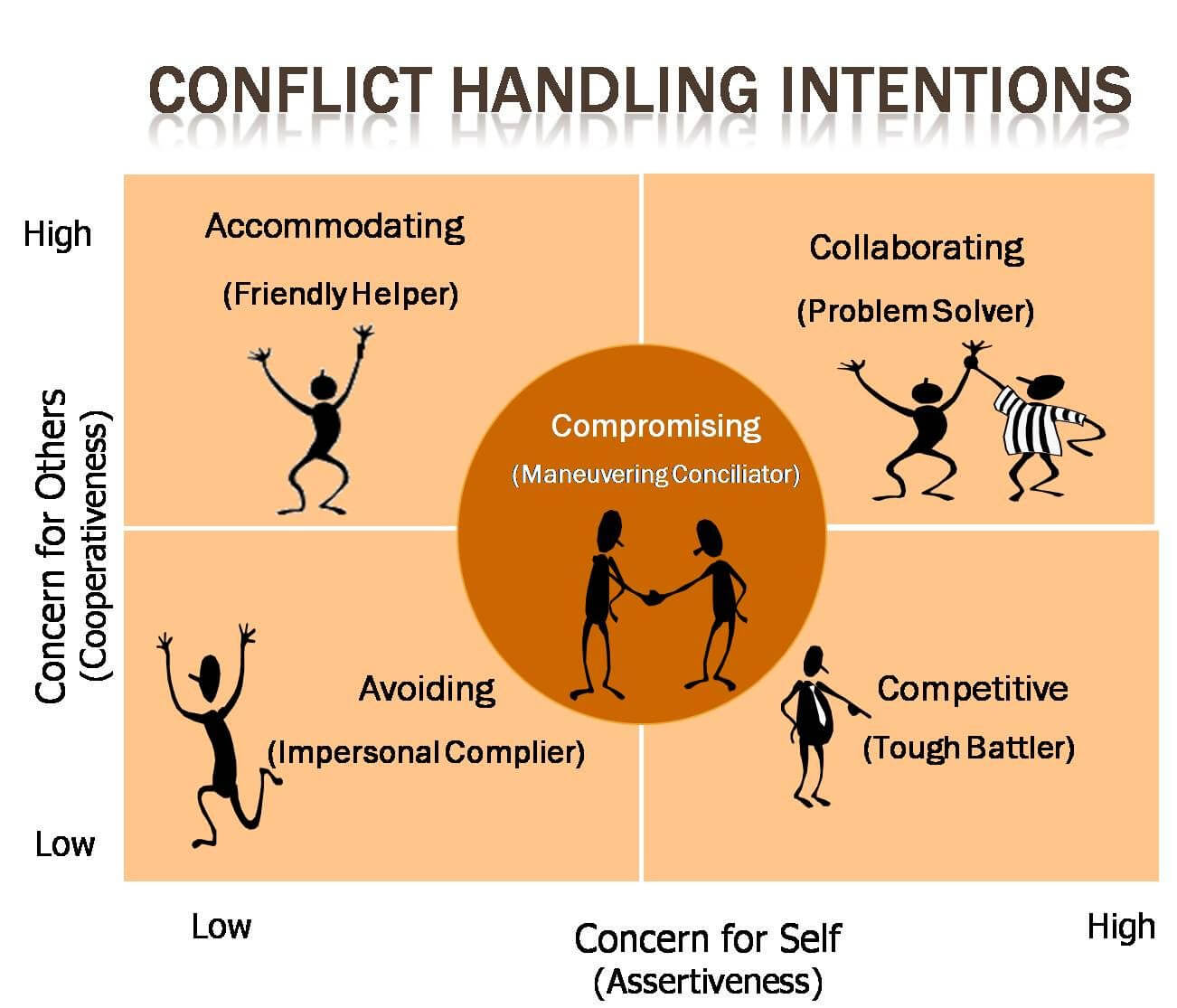Conflict resolution skills are not solely the prerogative of managers or sales representatives. Such aptitudes can make a world of difference in productivity, interpersonal relationships, goal achievement, and more in any organization. We have mentioned conflict management skills many times before. They are difficult to assess in the pre-employment evaluation stage, but nothing is impossible for experienced recruiters using the proper tools. Today, we will discuss conflict resolution skills, starting with their definition and offering examples and evaluation methods.
Conflict Resolution Skills Definition
At its core, conflict resolution in the workplace represents an employee's ability to constructively address, manage, and solve differences of opinion, arguments, disagreements, and complaints. People with good conflict resolution skills find practical solutions to such oppositions and put the conflict to rest.
Looking at the bigger picture, we quickly realize that conflict resolution skills are, in fact, interpersonal skills we are always looking for in the hiring process. Moreover, they go hand in hand with teamwork, communication, emotional intelligence, negotiation aptitudes, and other soft skills and personality traits.
Why Do We Need Individuals with Conflict Resolution Skills in the Workplace?
Some experts say that conflict management and resolution are top priorities when hiring managers or working with the executive branch to offer established employees promotions and higher roles. Nevertheless, it is crucial to identify and grow such skills across all small or large teams within any enterprise.

Conflicts, disagreements, shenanigans, and frustrations arise every day at the workplace, at home, and in social spheres. When we hire talent, we need to look beyond job descriptions and focus on finding people who match the organizational culture to become assets and future leaders.
When it comes to conflicts, they can show up everywhere: between team members, between managers and subordinates, between the company's representatives and customers, and even between larger groups (interdepartmental conflicts).
As we said, conflict resolution skills are difficult to assess a priori, but experienced recruiters don't have problems with their identification. Most people cannot tell you many things about such skills they might possess, but they can certainly show and demonstrate them given the right context.
Conflict resolution encompasses a constellation of cognitive skills, specific personality & behavioral traits, general and emotional intelligence quotients, and more. Luckily, we have plenty of instruments at our disposal to assess such subtle interpersonal abilities.
5 Conflict Resolution Skills Examples
To make things simpler, let's see some of the most crucial conflict resolution skills we need to pay attention to during the pre-employment assessment stage. You should know that many other characteristics, traits, attitudes, and aptitudes help people manage conflicts at work and in their personal lives. However, it would help if you focused on those that match your organizational culture the best.
1. Communication
Conflict prevention, management, and resolution skills go hand in hand with communication abilities. We don't talk about only the skill of transmitting a clear, concise message to make a valid point. Good communication aptitudes also include:
- active listening, with all its processes and techniques;
- reading non-verbal cues,
- relieve stress and frustration by showing empathy towards the other,
- knowing when to speak and when to stay quiet,
- keeping a calm and positive attitude, and more.
How to Test Communication Skills
You can test such communication skills as they play out in real-time during a behavioral interview focused on conflict resolution, teamwork, and even leadership skills. To back up your observations, we encourage you to use the Big 5 Personality Inventory as well. Look for candidates with high scores on openness, agreeableness, and conscientiousness. Research repeatedly proved that the Big 5 personality test is a good predictor of conflict management styles, so apply the test to get in-depth insights into your candidates' personalities.
2. Assertiveness
Being assertive is a skill more, and more people are trying to develop throughout their adult life. Some go to therapy for personal optimization; others follow workshops and seminars on this topic. It is clear that assertiveness reduces stress, improves communication, and is one of the most powerful tools we have in conflict resolution.
As HR experts, we consider assertiveness a communication style, but psychologists go a little beyond this realm. Assertiveness is a skill and behavior we can apply on all levels and areas of our personal, social, and work lives. We talked about it when discussing interpersonal skills and might pay more attention to this topic in a future guide.
How to Test Assertiveness
For conflict resolution skills assessment, it is best to focus on assertiveness as a conflict management style instead of passive or aggressive methods to handle conflicts. This particular style implies open-mindedness, active listening, the show of respect towards others, a balanced stance, leadership skills, and more.
You can measure a candidate's assertiveness using the Functional Assertiveness Scale. Alternatively, you could design a behavioral interview focused on identifying and measuring the core assertiveness traits. An assertive behavior or style correlates with self-control, emotional stability, constructive feedback skills, solution-seeking, responsibility, etc. For this reason, you can use plenty of personality inventories, interview questions, and simulations to evaluate candidates.
3. Problem-Solving Skills
When it comes to conflict resolution, problem-solving skills kick in when an employee or a manager has to approach a challenge objectively and come up with as many ways as possible to resolve it. In this regard, problem-solving and creative thinking go hand in hand.
It is one thing to solve a complex, abstract finance problem and a completely different approach when finding the root cause of a workplace conflict and offering alleviation solutions.
As a transferable skill, problem-solving comes into play when employees prefer to tackle a problem rather than deny or avoid it. However, problem-solving in conflict management means an individual's willingness to revisit the initially chosen solutions and try other solutions if the first ones did not work.
Such skill comes in handy when co-workers and managers collaborate to prevent further conflicts or identify them in their early stages and resolve them before they escalate.
How to Test Problem Solving Skills
Use a cognitive test to evaluate overall intelligence, problem-solving, decision making, the ability to maintain focus, and the ability to understand problem causes, no matter how complex. Nevertheless, it would help if you did not stop here.
Simulations and behavioral interviews (based on fine-tuned candidate scorecards) are also great instruments to assess applicants' capacity to transfer cognitive problem-solving skills to human interactions and conflict management methods.
4. Frustration Tolerance and Stress Management
Stress, frustration, and conflict make a vicious circle in teams and groups. They are trigger and supporting factors for each other. It doesn't matter if frustration led to conflict or if a present conflict increased the team's stress levels. All that matters is that managers and employees need to have and use the necessary emotional tools to cope with stress and alleviate the conflict before it gets out of control.
You don't need to be a trained clinician to know that when people control their own emotions and use coping mechanisms for frustration/stress, they also communicate better. Handling stress healthily means rational and calm expression and willingness to collaborate to solve discords and disagreements.
How to Test Frustration and Stress Management
Some of the best instruments you can use for such evaluations are personality and behavior inventories. As you know, some personality dimensions are more vulnerable to frustration and cope with stress inefficiently. Nevertheless, you have plenty of other instruments at your disposal. Behavioral interviews are great tools to assess a candidate's declarative position towards frustration, stress, and conflict resolution.
Alternatively, it could be useful to consider the Mirror Tracing Persistence Task, an instrument used in clinical environments in the context of anxiety disorders. In recruiting, we seldom use clinical assessment tools, but you can do your research and implement the principles of such evaluations in your simulations or interviews.
5. Positive Mindset
When it comes to conflict resolution skills, positivity is among the crucial ones. A positive mindset towards conflict means being willing to find actionable solutions, not just half-hearted compromises. Moreover, such an attitude is a motivational factor for others as well. Leading by example is always a good way to deal with conflicts inside small or large teams. When someone is positive about facing, understanding, and solving a conflict, such attitude acts as a catalyst for others to follow suit.
Conflicts contain, by nature, a series of roadblocks. Positivity means that employees are willing to overcome the obstacles so they can all reach a commonly agreed resolution. Conflict participants who have a negative attitude are more likely to make things worse, avoid the conflict altogether, or have difficulties in embracing a compromise.
How to Test the Positive Mindset
You can identify this attitude or trait in people from the first encounters you have with them to prepare the pre-employment assessment process. However, behavioral interviews and well-chosen personality assessment tools can help you identify such qualities in candidates.
Check out this guide on pre-employment personality tests and pick the right ones for your needs. The Big 5 Personality Inventory, the NEO-PI-R, and the DiSC inventory are good tools to understand how a future employee might act towards conflict handling and solving.
A positive mindset also includes integrity beside consciousness, optimism, gratitude, mindfulness, and more. In other words, an integrity assessment might do you good if you use it along with other behavioral & personality evaluation tools.
Conflict Resolution: Final Thoughts

One should not mistake conflict resolution skills with conflict management styles. We will talk about the latter in a separate guide. Identifying the skills and assessing them has a lot to do with organizational culture.
Hiring only "non-conflictual" employees might affect productivity and innovation in the long term. Disagreements, a difference of opinions, and even conflicting solutions to problems kindle the fire of progress when we approach them constructively. Without conflict, there is no change or growth.
For this reason, we don't hire anyone just because a person shows strong signs of avoidance. On the contrary, avoidance is a huge issue in challenging working environments. We hire, however, focusing on people who are capable of dealing with conflict at all levels and willing to use such situations to grow and innovate. After all, conflict resolution skills are the ones pointing us forward on the path of finding leaders.
How do you identify and evaluate conflict resolution skills in applicants? We'd love to hear more about your experiences, tools, and methods to hire talented employees who can manage conflict with flying colors!

